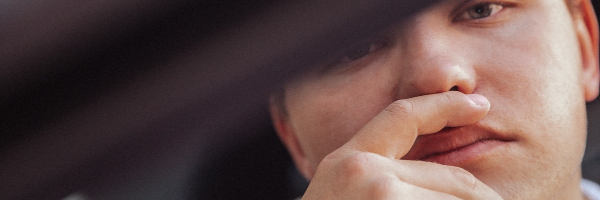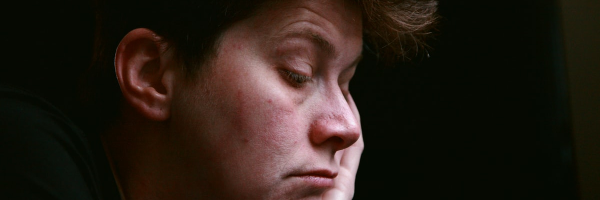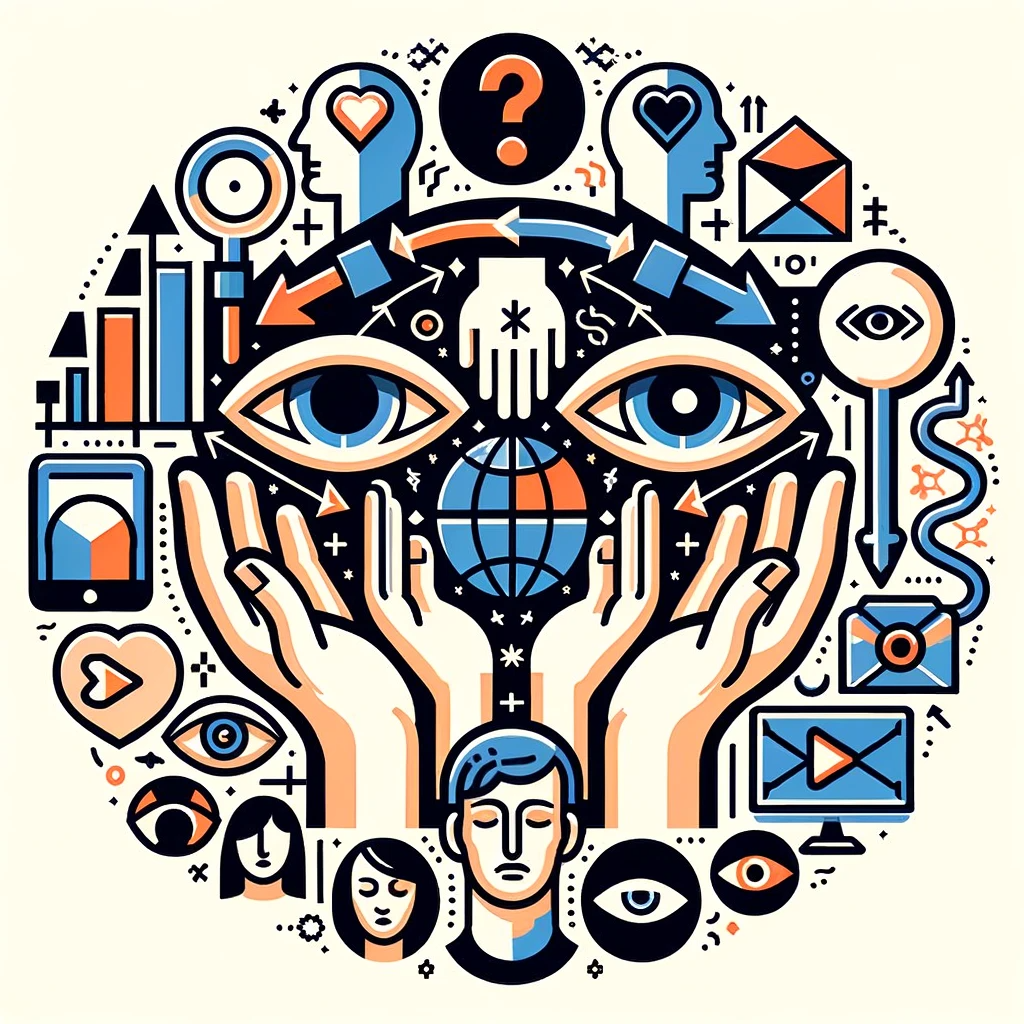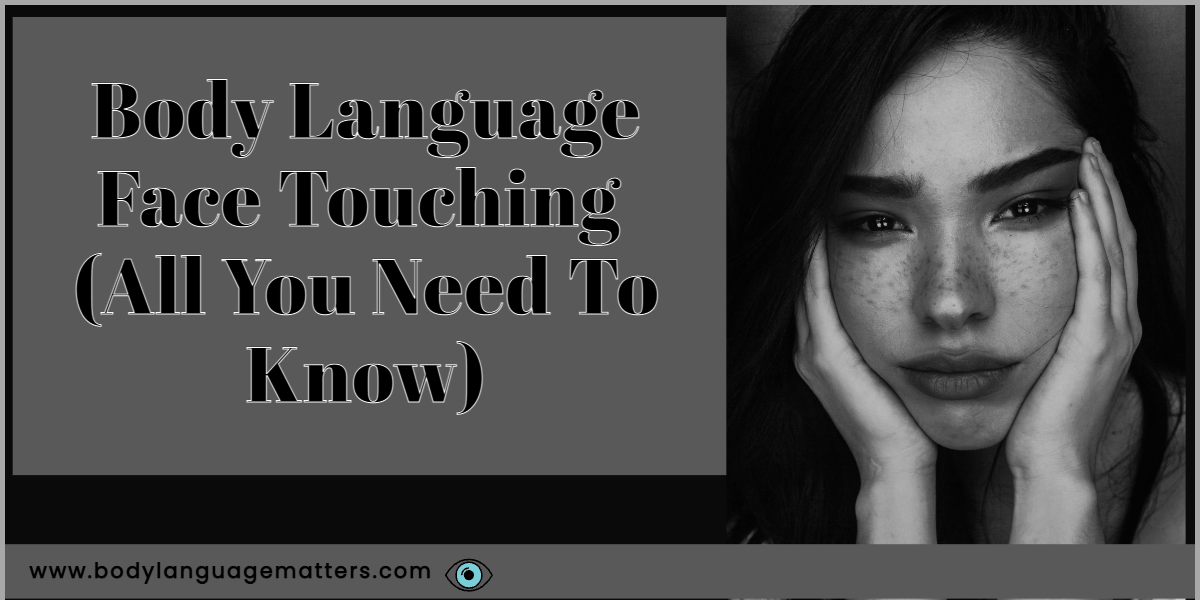People touch their faces for various reasons. It could be as simple as scratching an itch or as complex as concealing emotions. Understanding the meaning behind face-touching isn’t straightforward without knowing the context.
Often, individuals touch their faces when they feel uneasy, whether in social or professional settings. This gesture might indicate a need for comfort or that they’re deep in thought.
For instance, if someone touches their nose, they might be trying to detect a scent or perhaps ward off an unpleasant smell. Similarly, touching the eyes can suggest a desire to avoid a particular thought or disagreement with what’s being said.
In essence, face-touching can convey a range of emotions and thoughts. This post delves into the various interpretations and body language cues associated with it.
Table of Contents
Face touching is a common human behavior, often done unconsciously. But why do people touch their faces? The reasons can range from simple physical needs to complex psychological triggers. For instance, an itch or discomfort might prompt someone to touch their face. On the other hand, it could also be a reaction to stress, anxiety, or deep contemplation.
TIPS
10 Actionable Tips on Understanding Face Touching in Body Language
- Context is Key: Always consider the situation when interpreting face touching. The same gesture can have different meanings in different contexts.
- Observe Patterns: Continuous face touching might indicate anxiety, stress, or a self-soothing mechanism.
- Look for Combinations: Touching the face along with other gestures, like avoiding eye contact, can provide more insight into a person’s feelings.
- Be Aware of Cultural Differences: Some gestures might have specific cultural meanings or interpretations.
- Ask Direct Questions: If you’re unsure about someone’s body language, especially during a conversation, don’t hesitate to ask open-ended questions or directly inquire about their feelings.
- Avoid Making Assumptions: Just because someone touches their face doesn’t necessarily mean they’re insecure or uninterested. They might simply have an itch or something in their eye.
- Watch for Changes in Behavior: A sudden increase in face touching, especially when paired with other body language shifts, can be telling.
- Educate Yourself: Watch videos or read more on the topic to understand the nuances of body language better. For instance, the provided YouTube links might offer more in-depth insights.
- Practice Observation: The more you observe and understand body language in various settings, the better you’ll become at interpreting it.
- Stay Open-minded: Remember that body language is just one form of communication. Always consider verbal cues and the overall context before drawing conclusions.
By being observant and understanding the nuances of face touching in body language, you can gain valuable insights into people’s feelings and thoughts. Keep these tips in mind, and you’ll become more adept at reading between the lines.
Understand Context First To Get A True Answer

Understanding the context is crucial when interpreting face touching. A gesture in one situation might mean something entirely different in another.
For example, a person touching their face during a challenging exam might be displaying signs of stress or deep thought. The same gesture during a casual conversation could indicate discomfort or disagreement with what’s being said.
Recognizing the importance of context helps in accurately interpreting the meaning behind face touching. It’s not just about the act itself but the situation, the accompanying body language, and the individual’s personal habits.
Face Touching in Different Situations

Touching face while talking:
This can be a sign of nervousness or discomfort. It might indicate that the person is unsure about what they’re saying or how it’s being received.
What it means when someone keeps touching their face: Continuous face touching can be a sign of anxiety or stress. It can also be a self-soothing gesture, helping the individual cope with an overwhelming situation.
Touching face and lips:
Touching the lips can indicate contemplation or secrecy as if holding back words or thoughts.
Touching face and hair: This gesture is often seen as flirtatious or as a sign of self-consciousness. It can also be a self-soothing action, especially if done repetitively.
Touching the chin and side of the face: This can signify deep thought or evaluation. It’s a gesture often seen when someone is making a decision or weighing their options.
Interpreting Face Touching in Body Language

Rubbing the face and its implications
Rubbing the face, especially the forehead or temples, can indicate stress, fatigue, or headache. It’s a clear sign that the person is experiencing some form of discomfort or unease.
Pop stars and face-touching
In the world of entertainment, face touching can be a choreographed move, meant to convey emotion or add flair to a performance. However, off-stage, it might be a sign of the pressures and anxieties that come with fame.
Men touching their face while talking to someone
While face touching is a universal behavior, when men touch their faces during a conversation, it can indicate a range of emotions. It might be a sign of attraction, especially if accompanied by dilated pupils or a raised eyebrow. Alternatively, it could signify discomfort, disagreement, or contemplation.
What Does Touching Your Face While Talking Mean?

When someone touches their face during a conversation, the meaning can vary based on the situation. For instance, if it’s a heated discussion, face-touching might be a way for the person to soothe themselves.
On a first date, if your date frequently touches their face, it could be a positive sign. Maybe they’re trying to look their best for you or drawing attention to their eyes. While it’s not a guaranteed sign of interest, it’s definitely promising.
Sometimes, face-touching can also indicate deep thought, suggesting the person needs a moment to ponder.
Ultimately, the context in which the gesture occurs is crucial. While face-touching can hint at various emotions or thoughts, it’s essential to notice if it’s accompanied by a sudden change in body language. Such shifts can provide more insight into what the person might be feeling or thinking.
What Does It Mean When Someone Keeps Touching Their Face?

If you see someone frequently touching their face, it’s known as a “cluster” or an “adaptor.” Consider the context: What’s the topic of conversation? Where are they? Are they at ease or uneasy? If there’s a change from their usual behavior, it’s a clear sign that something’s on their mind. It’s your call if you want to dig deeper and understand why
What Does Touching Face And Lips Body Language Do?

When someone touches their face and lips, it can reveal a lot about their mood. For instance, if they nod while doing so, it might suggest they’re feeling confident. Touching just below the mouth can also be a sign of self-assurance.
Face and lip touching can also indicate that someone is deep in thought or processing new information. In some situations, it might even show dominance or a sense of power, especially if paired with behaviors like avoiding eye contact or adopting a specific body posture.
Yet, it’s essential to remember that the same gesture can mean different things. For example, touching the lips might show fear, uncertainty, or even excitement, depending on the situation.
In short, there are various reasons why we might touch our faces and lips, and context is key to understanding them.
What Does Touching Your Chin Mean In Body Language?

When someone touches their mouth with their hand, it often means they’re pondering whether to speak their mind or not. If they touch their mouth while listening, it could be because they’re unsure about the topic being discussed. And if they touch their chin, it’s usually a sign that they’re deep in thought.
What Does Touching Side Of Face Body Language?

Touching your face is a gesture that says you are considering what someone has said to you or the feelings they have shown.
There are various other gestures that may also be associated with this gesture, some people will touch their nose or their chin.
What Does Rubbing Face Mean In Body Language?
If someone is rubbing their face, they might be feeling tired or uninterested. It’s important to notice this, especially during a chat. Look at their overall demeanor – are they energetic or sluggish? Are they engaged in a conversation?
The situation matters too. Maybe they feel their face is dirty, or they’re hinting that you should freshen up. Or perhaps there’s an issue with their face.
Always keep an eye out for such gestures; they can reveal a lot.
Body Language: Why Are Pop Stars Obsessed With Touching Their Faces?

People touch their faces for various reasons. For some, it’s a way to feel confident and at ease, a gesture known in body language as an “adaptor.” Pop stars might do it to appear more assertive, which can be perceived as attractive or commanding.
However, the meaning behind face-touching varies based on the situation and the person. There’s no set rule about when it’s appropriate to touch your face in public.
So, why do you think someone might touch their face? They could have something in their eye, an itch to address, or maybe their hair is bothering them. The reasons can be many and varied.
What Does It Mean When A Man Touches His Face While Talking To You?
Touching the face can often indicate feelings of insecurity or a lack of confidence. Men who frequently touch their faces during a conversation might be trying to avoid direct eye contact, signaling their unease.
If a man does this while talking to you, it could mean he’s attracted to you but unsure how to show it. Alternatively, it might indicate the opposite—that he’s not into you. To gauge the situation, pay attention to the flow of the conversation.
If you’re feeling bold, ask open-ended questions or directly inquire, “How do you think this is going?” to get a clearer sense of his feelings.
You may also like
Frequently Asked Questions

What is body language face touching?
Body language face touching refers to the movements of your hands or fingers on your face or head. It is a subconscious behavior that can convey various messages or emotions.
What are some common reasons for face touching?
Face touching can occur due to boredom, lack of interest, or discomfort. It can also be a result of nervousness or anxiety.
How can facial expressions be affected by face touching?
When we touch our face, it can affect our facial expressions. For example, if we touch our face while speaking, it may indicate uncertainty or doubt.
Why do people look away when they touch the back of their neck?
Looking away while touching the back of the neck is a common body language signal. It often indicates a lack of confidence or discomfort in a situation.
Is face touching more noticeable when the verbal language contradicts it?
Yes, face touching becomes more noticeable when the verbal language contradicts it. For example, if someone says they are confident but constantly touches their face, it may indicate a different underlying emotion.
Why should we keep our hands away from our face during communication?
Keeping our hands away from our face during communication is important because it allows for better eye contact and signals openness. It also avoids potential distractions or misinterpretations of body language signals.
Why is it important to look at the face of the person you are speaking to?
Looking at the face of the person you are speaking to helps establish a connection and shows active engagement in the conversation. It also allows you to read their facial expressions and reactions.
What does it mean if someone leans back and avoids a listener’s gaze while touching their face?
Leaning back and avoiding a listener’s gaze while touching the face may indicate insecurity or discomfort. It can also suggest a lack of confidence in what they are saying.
Why do people touch their face when they have doubts about the speaker’s words?
Touching the face can be a subconscious response when the listener doubts the speaker’s words. It is the brain’s attempt to block the information and protect itself from potential deception or false information.
Final Thoughts.
Face touching in body language speaks volumes. It can send various messages and even enhance one’s appeal. However, some gestures, like touching your face and lips, might not always be received well.
Body language can communicate feelings and thoughts without uttering a word. It’s essential to be mindful of our actions and not just our words. We hope this post provided insights into what you were curious about. Until next time, take care!

